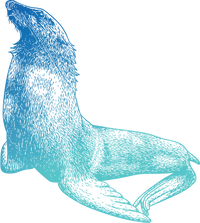We are thrilled and honored to announce the Seattle Aquarium is now a proud member of the International Union for Conservation of Nature (IUCN).
“It’s an incredible honor to be welcomed and recognized by IUCN for our role in marine conservation and research,” Seattle Aquarium President and CEO Peggy Sloan says. “Our ability to contribute to, support, and inform species recovery planning in collaboration with IUCN colleagues enhances the impact of all of our shared efforts.”
Created in 1948, IUCN is now the world’s largest and most diverse environmental network, harnessing the knowledge, resources and reach of more than 1,400 member organizations and more than 17,000 experts around the world. Working with many partners and supporters, IUCN spearheads many conservation projects worldwide, working to reverse habitat loss, restore ecosystems and improve animal wellbeing.
One of these many programs include the IUCN’s Species Recovery Commission’s Otter Specialist Group, leading global otter conservation since 1974. The Seattle Aquarium’s Senior Conservation Research Manager Dr. Shawn Larson serves as the Deputy Chair of the group and as the species coordinator for sea otters along with Amy Olsen, Research Scientist and serves as part of the group’s management team. The purpose of the Otter Specialist Group is to oversee and determine the conservation status and needs of otters, as well as to promote the implementation of necessary research, conservation and management programs to recover all 14 species worldwide.
“I have worked with sea otters for over 30 years,” Dr. Larson says. “They have taught me so much. Sea otters are different biologically and physically from every other otter and marine mammal. They have the thickest fur in the animal kingdom and a high metabolism which gives them their status as a keystone species structuring the ecosystems in which they live.”
The Seattle Aquarium Research Program launched in 1995 with a project focused on sea otters and their successful reproduction in human care. Since then, we have contributed to the understanding of sea otter population biology and ecology through multiple studies focused on endocrinology, population genetics, the recovery of genetic diversity of populations, the recovery from near extinction as documented by sea otter numbers and diets, and their role as a keystone species in enhancing and stabilizing the marine ecosystems where they live.
Dr. Larson also founded and continues to lead the biennial Sea Otter Conservation Workshop, the largest international meeting of sea otter biologists in the world. Hosted by the Seattle Aquarium since 1999, the workshop brings together the latest in sea otter research and science, with topics ranging from sea otter population status, biology and ecology to veterinary medicine, advocacy and conservation.
“My research and work with sea otters have taught me many things, including how complete ecosystems with top predators can resist climate change by stabilizing ecosystems, even in the face of warming and more acidic oceans. They have also taught me about community and family as they live in tight social groups their whole lives,” Dr. Larson says. “I have come to believe that sea otters can help save the world at least in the Pacific nearshore areas that they call home.”
Dr. Larson will represent the Aquarium at the IUCN World Conservation Congress in October, an event that’s held every four years that gathers nature conservation experts, leaders and decision-makers from around the world. The Congress includes the Members’ Assembly, where member organizations—now including the Seattle Aquarium—make decisions that influence global policy and set the conservation agenda for years to come.
“Becoming a member of IUCN amplifies our ability to revitalize endangered populations, ultimately leading to the setting aside of marine protected areas and restoration of our ocean. Collaboration, locally and globally, paves the way for real impact,” Peggy Sloan says.
You can learn more about Seattle Aquarium’s research and species recovery work on our website.
About the Seattle Aquarium:
Founded in 1977, the Seattle Aquarium is a marine conservation organization working to regenerate the health of Earth’s one ocean. We work among global leaders to advance animal wellbeing, marine and ecosystem science, public policy, field conservation, education, and species recovery programs that benefit the ocean. Help support the Aquarium’s mission of Inspiring Conservation of Our Marine Environment.
On the web: SeattleAquarium.org
On Facebook: facebook.com/Aquarium.Seattle
On Instagram: instagram.com/seattleaquarium
On Youtube: youtube.com/seattleaquarium
